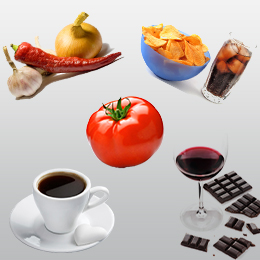Whether you are overweight or not, if you suffer from acid reflux you need to modify your diet. What you eat, how you eat, and when you eat, play a critical role in acid reflux disease management.
1. What you eat:
Certain food items trigger a reflux episode. It might be red wine for some or tomato sauce for others. It is not well understood why and how certain food items cause acid reflux. Some like mint, chocolate, and alcohol are believed to relax the lower esophageal sphincter. Irrespective of the cause, avoiding these trigger food items prevents acid reflux.
2. How you eat:
The upper part of the stomach is called gastric fundus. As you are enjoying your meal, the gastric fundus gradually stretches to accommodate the consumed food. Eating too much food during a meal over-stretches the gastric fundus. Excessive distention puts pressure on the lower esophageal sphincter. With time, the sphincter weakens and acid escapes into the esophagus. Most people resort to tums and antacid medications to alleviate their symptoms. They develop a habit of overeating and medicating instead of changing their eating habits to prevent worsening acid reflux symptoms.
3. When you eat:
Food consumption before going to bed at night worsens nighttime acid reflux. When lying flat, acid reflux tends to stay longer in the esophagus, causing more damage. Raising the head of the bed allows gravity to protect the esophagus from acid reflux. Most importantly, however, is to avoid eating 4 hours prior to going to bed to make sure your stomach is empty by the time you lay down.
In summary, understand your acid reflux disease and listen to your body. Adopt a reflux-friendly diet and don’t over-medicate yourself with tums and antacids. At Houston Heartburn and Reflux Center, we target the causes of reflux and not only the symptoms. If you have acid reflux disease, please contact us.

